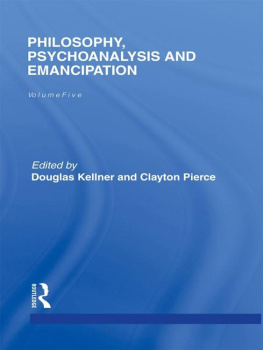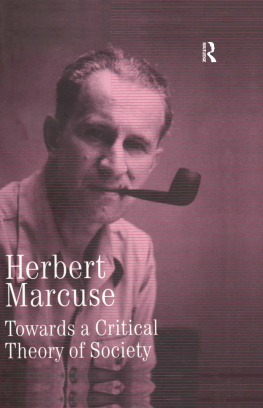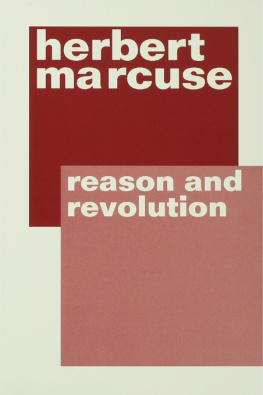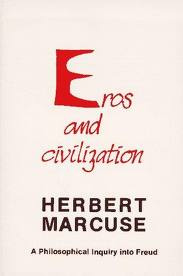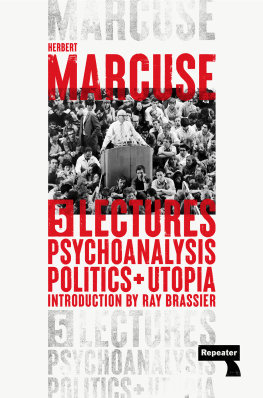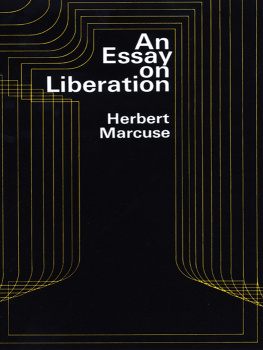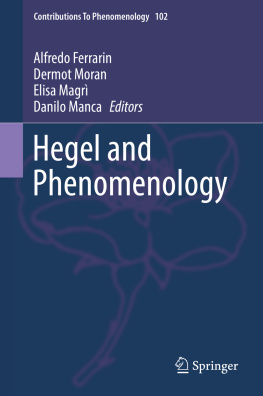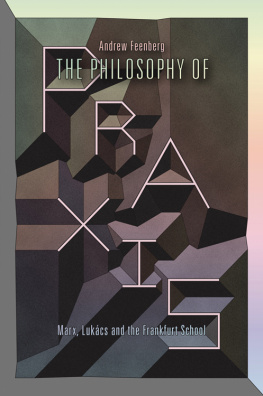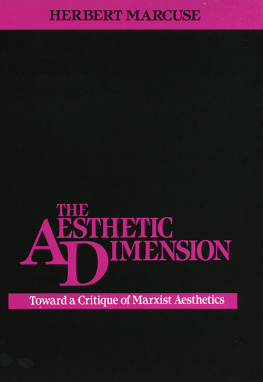COLLECTED PAPERS OF HERBERT MARCUSE
EDITED BY DOUGLAS KELLNER AND CLAYTON PIERCE
Volume One
TECHNOLOGY, WAR AND FASCISM
Volume Two
TOWARDS A CRITICAL THEORY OF SOCIETY
Volume Three
THE NEW LEFT AND THE 1960s
Volume Four
ART AND LIBERATION
Volume Five
PHILOSOPHY, PSYCHOANALYSIS AND EMANCIPATION
Volume Six
MARXISM, REVOLUTION AND UTOPIA
HERBERT MARCUSE (18981979) is an internationally renowned philosopher, social activist and theorist, and member of the Frankfurt School. He has been remembered as one of the most influential social critical theorists inspiring the radical political movements in the 1960s and 1970s. Author of numerous books including One-Dimensional Man, Eros and Civilization, and Reason and Revolution, Marcuse taught at Columbia, Harvard, Brandeis University, and the University of California before his death in 1979.
DOUGLAS KELLNER is George F. Kneller Chair in the Philosophy of Education at UCLA. He is author of many books on social theory, politics, history, and culture, including Herbert Marcuse and the Crisis of Marxism, Media Culture, and Critical Theory, Marxism and Modernity. His Critical Theory and Society: A Reader, co-edited with Stephen Eric Bronner, and book Media Spectacle, are also published by Routledge.
CLAYTON PIERCE is a research assistant professor in the department of Education, Culture, and Society at the University of Utah. His books include On Marcuse: Critique, Liberation, and Reschooling in the Radical Pedagogy of Herbert Marcuse (with Douglas Kellner and Tyson Lewis) and Marcuses Challenge to Education (with Douglas Kellner, Tyson Lewis, and Daniel Cho). He has published also in Educational Theory and Policy Futures in Education.
PHILOSOPHY, PSYCHOANALYSIS AND EMANCIPATION
HERBERT MARCUSE
COLLECTED PAPERS OF HERBERT MARCUSE
Volume Five
Edited by
Douglas Kellner and Clayton Pierce

LONDON AND NEW YORK
This edition published 2011
by Routledge
2 Park Square, Milton Park, Abingdon, Oxon OX14 4RN
Simultaneously published in the USA and Canada
by Routledge
270 Madison Ave, New York, NY 10016
Routledge is an imprint of the Taylor & Francis Group, an informa business
This edition published in the Taylor & Francis e-Library, 2011.
To purchase your own copy of this or any of Taylor & Francis or Routledges collection of thousands of eBooks please go to www.eBookstore.tandf.co.uk.
2011 Peter Marcuse
Selection and editorial matter 2011 Douglas Kellner and Clayton Pierce
Herbert Marcuse, Philosophy, Psychoanalysis and Emancipation: An Introduction 2011 Douglas Kellner, Tyson Lewis, and Clayton Pierce
Marcuse as Philosopher 2011 Andrew Feenberg
All rights reserved. No part of this book may be reprinted or reproduced or utilised in any form or by any electronic, mechanical, or other means, now known or hereafter invented, including photocopying and recording, or in any information storage or retrieval system, without permission in writing from the publishers.
British Library Cataloguing in Publication Data
A catalogue record for this book is available from the British Library
Library of Congress Control Number: 97154404
ISBN 0-203-83870-X Master e-book ISBN
ISBN13: 9780415137843 (hbk)
ISBN13: 9780203838709 (ebk)
CONTENTS
Introduction
Herbert Marcuse, Philosophy, Psychoanalysis and Emancipation
DOUGLAS KELLNER, CLAYTON PIERCE, AND TYSON LEWIS |
Afterword
Remembering Marcuse
ANDREW FEENBERG |
INTRODUCTION
Herbert Marcuse, Philosophy, Psychoanalysis and Emancipation
Douglas Kellner, Clayton Pierce, and Tyson Lewis
Philosophy, Psychoanalysis and Emancipation, Volume 5 of the Collected Papers of Herbert Marcuse, presents for contemporary readers Marcuses unique syntheses of philosophy, psychoanalysis, and critical social theory, directed toward human emancipation and social transformation. Within these disciplines, Marcuse critically engaged disparate currents ranging from Heidegger and phenomenology to Hegel, Marx, Dewey, and Freud to create unique philosophical perspectives and analyses, often overlooked in favor of his social theory and political interventions with the New Left, the subject of previous volumes.
The collection assembles significant, largely unknown, texts from the Herbert Marcuse archives in Frankfurt, important, and in some cases unknown, critiques of positivism and idealism, Deweys pragmatism, and the tradition of German philosophy; philosophical essays from the 1930s and 1940s that attempt to reconstruct philosophy on a materialist base; Marcuses unique attempts to bring together Freud, philosophy, and critical social theory; philosophical reflections on death, human aggression, war, and peace; and his later critical philosophical perspectives on science, technology, society, religion, ecology, and human emancipation.
These philosophical themes are connected to genealogical lines of development that appear as one assesses Marcuses intellectual and political growth, which help define his unique critical theory project. The task we undertake in the Introduction to this volume is to make prominent these threads of Marcuses critical theory that play a major role in his theoretical synthesis. We see Marcuse as moving beyond traditional approaches to philosophical and social problems in a highly productive and relevant manner. Struggling against the conceptual and political limitations of various thinkers and movements, Marcuse developed a synthetically robust and historically attuned critical theory capable of confronting the multifaceted problems facing contemporary civilization as it continued to produce damaged conditions for human and non-human life under capitalist organization.
In this sense, Marcuses Marxist reworking of Heideggerian interpretations of being and historicity, the development of a Freudian critical theory of the psyche and society, and critiques of intellectual movements such as idealism, positivism, and pragmatism should be understood as philosophical endeavors interested in constantly reevaluating the capabilities of critical theory for developing a metacritique of human domination that ultimately aimed at human emancipation. The subjectobject relation, the psyche/society/nature dialectic, and perhaps most importantly, the effects of science and technological rationality on human life are just some of the examples of philosophical and social problems that Marcuse reinterpreted in novel ways within his constantly evolving critical theory of society.
In sum, Heidegger, Hegel, Marx, and Freud appear as privileged interlocutors because they open up the path for reconceptualizing the strengths and weaknesses of critical theory in light of historical tendencies. Primarily a philosopher, Marcuse demonstrated that philosophy could concern itself both with the crucial political issues of the day and with traditional philosophical problems and prospects for human emancipation. The Introduction to the volume will situate Marcuses engagement with philosophy in the context of main currents of twentieth-century philosophy and the development of his own philosophical perspectives. Marcuses enduring philosophical contributions will be presented, along with the intense controversy over his work and its continuing relevance for challenges of the contemporary moment.

